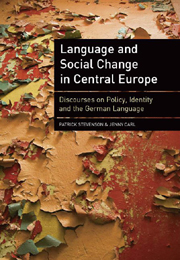Book contents
- Frontmatter
- Contents
- Acknowledgements
- List of Tables
- Transcription Conventions
- Map of Central Europe
- 1 Introduction
- 2 Discourses on Language in Social Life: Theoretical and Methodological Orientations
- 3 Sociolinguistic Histories and the Footprint of German in Eastern Central Europe
- 4 Language Policy Discourses: Interventions and Intersections
- 5 Language (Auto)biographies: Narrating Multilingual Selves
- 6 Language Ideologies: Negotiating Linguistic Identities
- 7 Conclusions
- Appendix A European Institutions and Documents Concerning Language Policy
- Appendix B Preamble to the European Charter for Regional or Minority Languages
- Appendix C Introduction to the 2005 Commission Communication ‘A New Framework Strategy for Multilingualism’
- Appendix D Introduction to the 2008 Commission Communication ‘Multilingualism: an asset for Europe and a shared commitment’
- Appendix E German and Austrian agents and institutions in foreign cultural policy
- Appendix F Extract from ‘Auswärtige Kulturpolitik – Konzeption 2000’
- Appendix G Central focus – ‘Leitbild’ – of the Goethe-Institut
- Appendix H Austria's Auslandskulturkonzept NEU
- Appendix I Plattform Kultur Mitteleuropa – Platform Culture Central Europe
- Appendix J Extract from Austria kulturint – Tätigkeitsbericht 2002
- Appendix K Czech 2001 White Paper on Education
- Appendix L Czech 2004 Education Act
- Appendix M Extract from Czech Follow-up of Action Plan on Language Learning and Linguistic Diversity
- Appendix N Hungarian 1997 Directive Concerning the Education for National and Ethnic Minorities
- Appendix O Extract from 2007 Hungarian National Core Curriculum
- Appendix P Extract from Hungarian Follow-up of Action Plan for Language Learning and Linguistic Diversity
- References
- Index
Appendix G - Central focus – ‘Leitbild’ – of the Goethe-Institut
Published online by Cambridge University Press: 05 February 2013
- Frontmatter
- Contents
- Acknowledgements
- List of Tables
- Transcription Conventions
- Map of Central Europe
- 1 Introduction
- 2 Discourses on Language in Social Life: Theoretical and Methodological Orientations
- 3 Sociolinguistic Histories and the Footprint of German in Eastern Central Europe
- 4 Language Policy Discourses: Interventions and Intersections
- 5 Language (Auto)biographies: Narrating Multilingual Selves
- 6 Language Ideologies: Negotiating Linguistic Identities
- 7 Conclusions
- Appendix A European Institutions and Documents Concerning Language Policy
- Appendix B Preamble to the European Charter for Regional or Minority Languages
- Appendix C Introduction to the 2005 Commission Communication ‘A New Framework Strategy for Multilingualism’
- Appendix D Introduction to the 2008 Commission Communication ‘Multilingualism: an asset for Europe and a shared commitment’
- Appendix E German and Austrian agents and institutions in foreign cultural policy
- Appendix F Extract from ‘Auswärtige Kulturpolitik – Konzeption 2000’
- Appendix G Central focus – ‘Leitbild’ – of the Goethe-Institut
- Appendix H Austria's Auslandskulturkonzept NEU
- Appendix I Plattform Kultur Mitteleuropa – Platform Culture Central Europe
- Appendix J Extract from Austria kulturint – Tätigkeitsbericht 2002
- Appendix K Czech 2001 White Paper on Education
- Appendix L Czech 2004 Education Act
- Appendix M Extract from Czech Follow-up of Action Plan on Language Learning and Linguistic Diversity
- Appendix N Hungarian 1997 Directive Concerning the Education for National and Ethnic Minorities
- Appendix O Extract from 2007 Hungarian National Core Curriculum
- Appendix P Extract from Hungarian Follow-up of Action Plan for Language Learning and Linguistic Diversity
- References
- Index
Summary
Unsere Vision
Das Goethe-Institut trägt als Kulturinstitut der Bundesrepublik Deutschland das vielfältige Bild Deutschlands in die Welt. Es eröffnet den Zugang zur deutschen Sprache, Kultur und Gesellschaft und fördert die internationale kulturelle Zusammenarbeit.
Wir, die Mitarbeiterinnen und Mitarbeiter in aller Welt, stehen für ein offenes Deutschland. Über kulturelle und politische Grenzen hinweg bauen wir Brücken. Durch unsere Arbeit entsteht Neues und Auβergewöhnliches, weil Menschen offen miteinander reden und phantasievoll zusammen arbeiten. Wir entwickeln die Fähigkeit, Eigen- und Fremdbilder zu hinterfragen und konstruktiv mit kultureller Vielfalt umzugehen.
Wir öffnen Grenzen zwischen Kultur, Bildung, Wissenschaft und Entwicklung und vertrauen auf die Kraft der Kunst, die Fragen stellt und auch verstören darf. Wir suchen Antworten auf die Zukunftsfragen der globalisierten Welt.
Unsere Aufgaben
Wir fördern und vermitteln die deutsche Sprache als Schlüsselqualifikation für Bildung, Beruf und Verständigung. Sie ist das Bindeglied vieler Menschen zu Deutschland. Wir bauen die Position der deutschen Sprache in der Fremdsprachenvielfalt aus und setzen Qualitätsstandards für den Deutschunterricht weltweit.
Wir schaffen Zugang zu Wissen und Information über Deutschland und bringen kulturelle Phänomene, Positionen und Erfahrungen unseres Landes international zur Geltung. Umgekehrt nutzen wir die Chancen, die der interkulturelle Dialog bietet, um wichtige Entwicklungen aus anderen Weltregionen nach Deutschland zu vermitteln.
Wir fördern weltweit das Verständnis für Europa und entwickeln gemeinsame europäische Perspektiven. Innerhalb Europas sind für uns die Mehrsprachigkeit und ein europäisches Bürgerbewusstsein entscheidend für eine vertiefte Einheit.
- Type
- Chapter
- Information
- Language and Social Change in Central EuropeDiscourses on Policy, Identity and the German Language, pp. 225 - 226Publisher: Edinburgh University PressPrint publication year: 2010



